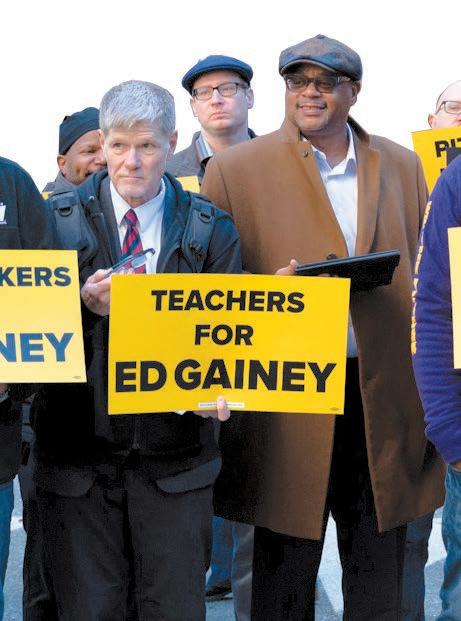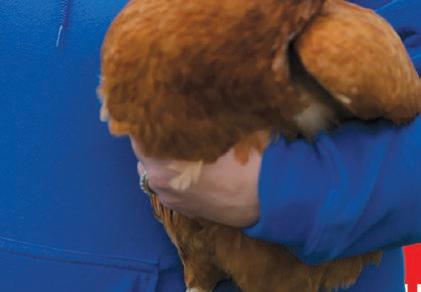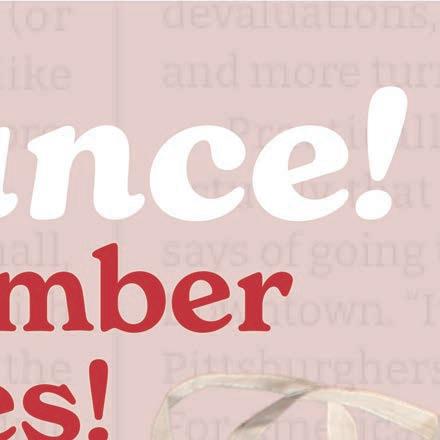






















































































On March 7, the Not on Our Dime campaign withdrew its petitions for a ballot referendum that would have prevented the City of Pittsburgh from doing business with governments actively engaged in genocide, ethnic cleansing, or apartheid — specifying Israel’s ongoing actions in the Gaza Strip.
The withdrawal marked the second time in as many years that the group, previously known as No War Crimes on Our Dime, ended a ballot initiative aimed at divestment amidst legal challenges. After gathering more than 21,000 signatures, which appear in court documents over 1,500 pages, Not on Our Dime stipulated it did not meet the required threshold of 12,500 valid signatures.
As with its last effort, the campaign faced objections filed in the Allegheny County Common Pleas Court by the Jewish Federation of Greater Pittsburgh and City Controller Rachael Heisler. Among other legal concerns, the Federation challenged the referendum based on “material errors and defects,” including not obtaining the requisite number of valid signatures. Heisler’s petition raised broader legal questions about the substance of the ballot question, which would have amended Pittsburgh’s Home Rule Charter.
Ahead of the first of two scheduled court dates, Not on Our Dime declared its intention to withdraw. In a 20-minute hearing before Allegheny County Common Pleas Judge John T. McVay Jr., lawyers hashed out how to manage the case, determining whether Not On Dime’s petitions would be withdrawn, effectively rendering legal challenges moot, or whether the campaign would stipulate to a dismissal signed by McVay finding the petition had a signature deficiency.
Attorney Ron Hicks, representing the Jewish Federation — and who previously served as legal counsel to Donald Trump in his attempts to overturn the 2020 election — argued for the latter approach because it would allow his clients to file for reimbursement of legal fees.
BY: RACHEL WILKINSON // RWILKINSON@PGHCITYPAPER.COM
“We’re engaged in some kind of law school class here,” Chuck Pascal, attorney for Not on Our Dime, told the court. Pascal tells Pittsburgh City Paper that once his clients made the decision to withdraw, he’d sought to cancel the hearing.
“It’s punitive,” Pascal says of the legal fee petition. “That’s why they keep wanting to have their show trial here.”

While the volunteer-led Not on Our Dime campaign has been characterized by its opponents and some media outlets as a failure and a loss, founder and steering committee member Ben Case tells City Paper that it’s led to “a lot of good conversations.”
“Despite it really being a tough pill to swallow, energy is pretty high, and there’s momentum to build on here,” Case says.
“I think there’s one sense in which [the description of ‘failure’] is true. If the goal was to put this on the ballot, it failed to reach the ballot,” Case says. “I think it failed because of lawfare, [which] was successful … It is a failure of democracy, because what we were trying to do was put this up for a vote.”
Had Not on Our Dime succeeded at getting the referendum on the ballot, and it passed, it would have been one of the first divestment initiatives in the U.S. to pass by popular vote. Due to the petitions’ withdrawal, legal challenges won’t be heard in court, but, according to Pascal, the case also had the potential to set precedent for Pennsylvania election law.
Objections filed by Controller Heisler and her counsel also revealed information about Pittsburgh’s budget and the ways in which,
by Heisler’s own admission, the city may already do extensive business with “badacting governments,” as they’re called in her court filing, in the manner that Not on Our Dime’s referendum sought to address. (The Controller’s Office did not respond to several requests for comment.)
A Feb. 25 press release announcing Controller Heisler’s court filing stated that the ballot question would “[create] an undue burden on the Controller’s office and City government,” as it “would significantly disrupt City operations due to the City’s dependence on the global economy.”
The statement goes on to give examples of governments accused of slave labor and genocide that the city ostensibly already conducts business with, claiming that 20% of all U.S. imports originate from China, “which has regularly been accused of carrying out a genocide against the Uyghur population since 2017.”
The release further speculates the referendum could prohibit the City from procuring any item using cobalt-based lithium batteries, which are “mined by workers laboring in slave-like conditions.”
“Who has a smartphone?” Heisler asked
the media in a press conference following the March 7 court hearing . “I’m guessing everybody. Apple and Google were sued by the International Rescue Committee because the material that is in this phone and in every phone in this room was mined by child labor in the Democratic Republic of [the] Congo … They’re in my car, they’re probably in yours. And no one’s talking about those issues.”
Case says these issues represent precisely what Not on Our Dime hoped to address and could be a point of commonality if Heisler is raising them in good faith.
“It seems to me that what Rachael Heisler is suggesting is that our city’s functions are dependent upon doing business with and sending money to a state that’s currently committing genocide and ethnic cleansing,” Case tells CP
Heisler’s court filing goes into even further detail. Statements by the Fraternal Order of Police and Fraternal Association of Professional Paramedics, attached as exhibits to Heisler’s filing, attest that the amendment, if implemented, would “substantially prohibit” the City’s ability to procure Naloxone, a life-saving drug that reverses

opioid overdose, as one-third of the world’s supply originates with Teva Pharmaceuticals, headquartered in Tel Aviv, Israel. The City’s police officers state they use body cameras, vests, and vehicles from companies, including weapons manufacturers, that do business with Israel.
Pascal, Not on Our Dime’s attorney, also points out that were the city to decide Israel is not committing genocide, ethnic cleansing, or apartheid, the amendment would have no effect.
“Can we agree, then, that the State of Israel is committing genocide and ethnic cleansing and running an apartheid regime? Because I think that would be a step in the right direction,” Case says. “If we could all agree that is what’s happening, then we could talk about how we want to proceed as a city … I think it is fully possible for the City of Pittsburgh to thrive while not sending our taxpayer money or doing business with countries that are engaged in genocide.”
Though her court filing, her office’s initial press release, and her public statement at the courthouse name other countries that could have fallen under the referendum’s scope, Heisler nonetheless called out Israel being
highlighted, saying it’s “suspicious” to single out the majority-Jewish country when “there are atrocities happening literally around the world.”
Case says that Not on Our Dime specifically incorporated criticism and broadened their amendment after researching the anti-apartheid movement in South Africa. Had divestment measures against apartheid governments been put in place previously, they would apply to Israel now, representing the campaign’s goal to align with “universal moral principles” and divest from any bad-acting government.
arguments are being made sincerely, with Case remarking that, if implementation were truly the stumbling block, no effort has been made to reach out to Not on Our Dime outside of court proceedings.
“I think a lot of these arguments align with what we see from the Israel lobby more broadly,” Case says. “They’re manipulating information and twisting facts to make it seem like there’s no alternative to dumping U.S. taxpayer dollars into a foreign country that’s committing genocide, ethnic cleansing, and apartheid.”
“IT’S NEXT TO IMPOSSIBLE TO PUT A QUESTION ON THE BALLOT IN PITTSBURGH UNLESS YOU ALSO HAVE A LOT OF MONEY.”
“People like to say that a city’s budget is a moral decision about how we spend our money,” Case tells CP. “And so that’s what this is about. [Heisler’s] examples just illustrate to me that there are alternative choices.”
Both Case and Pascal question if Heisler’s
Though representatives of the Jewish Federation stressed its independence from Heisler in an interview with CP , the organization held a joint press conference with the controller, along with Beacon Coalition and StandWithUs, following the March 7 court


hearing. Heisler is listed as part of the board of directors for Jewish Family and Community Services, a partner of the Jewish Federation, and notes she was a 2022-23 Wechsler Fellow with the Jewish Federation in her official biography. eisler s office has told other outlets she is not Jewish.)
eisler is within her legal rights to file objections to the referendum. However, it’s unclear to what extent a city controller, who directly oversees city tax dollars, challenging a city budgetrelated referendum on the use of those dollars could represent a con ict of interest, according to Case.
As understand it, the Controller s job is to do the city s accounting and budgeting in accordance with the will of the voters, not to dictate to voters what they do and don’t get to decide about how our tax dollars are spent,” Case tells CP
Court documents also show Heisler’s lawyers planned for an extensive hearing, with a list of 30 witnesses including Heisler. Pascal estimates it could have prolonged proceedings until May, nearing the primary election date.
“Listen, here’s the deal: we can say anything we want in a political campaign,” Pascal tells CP. “We can embellish. But my point is, this is a court. You don’t do that there.”




The end of Not on Our Dime’s current campaign also augurs poorly for direct democracy, Case believes.
Pascal is an attorney who specializes in ballot referendum challenges, and names one hurdle as Pennsylvania’s Act 77, the election law that created the state’s vote-by-mail system in 2019. While Pascal describes the law as “one of the worst-written pieces of legislation,” parts of which were later challenged in the state Supreme Court, it also established a lesser-known rule for Pennsylvanians signing referendum petitions.
represented a significant percentage of the signature challenges made to the Not on Our Dime petitions. Signatures can also be invalidated for illegibility, an incomplete address line, or voters writing their zip code after their address rather than their city or the date. In addition, if people collecting ballot referendum signatures, referred to as circulators, write their own county of residence rather than the county where voters are signing, signatures can be invalidated. Pascal says many circulators write “demonstration” lines with their own information (which may also be written incorrectly) to show voters how to fill out the petition, which
“WE CAN SAY ANYTHING WE WANT IN A POLITICAL CAMPAIGN. BUT THIS IS A COURT. YOU DON’T DO THAT THERE.”
Under Act 77, voters’ signatures are only valid if they write the address where they’re registered to vote (rather than where they live), even if they are registered voters in that city.
“There’s some places in the city where two or three or four precincts vote at the same place,” Pascal explains. “So in my mind, as a regular person, not as somebody who knows the law, what’s the difference?”
Pascal believes incorrect addresses
Jewish Federation lawyers alleged constituted circulator fraud.
Case says that Not on Our Dime validated signatures from more than 12,500 registered Pittsburgh voters, but not that met state signature requirements. The campaign also looked into changing the petition form to make it clearer for voters, but couldn’t alter it by state law. “The bar is way too high. There’s no question,” Case says. “The thing that’s really upsetting, and
I hesitate to say this because I believe in direct democracy, is that what I think this process showed is that, if there is an opposition with lots of resources, it’s next to impossible to put a question on the ballot in Pittsburgh unless you also have a lot of money.”
The last petition-driven ballot referendums passed in Pittsburgh were the no-knock warrant and solitary confinement bans, which passed in May 2021 with 81% of the vote. Case points out neither question faced legal challenges before appearing on the ballot, and signature collection was bolstered by paid organizers.
Asked about avenues for divestment, the Jewish Federation of Greater Pittsburgh wrote to CP, “We believe that individuals and nonprofits have the right to make their own investment decisions. Pittsburghers and our elected officials are committed to ensuring that tax dollars and investments contribute to positive, socially responsible outcomes. Boycotts, divestment, and sanctions (BDS) run counter to that goal.”
The Jewish Federation told CP their organization has a policy of making no direct financial investments in Iran, but they do not consider this to be divestment. Regarding the legal fee petition, the Federation commented that it’s pursuing avenues within its legal rights.
Some of Controller Heisler’s last public words on the matter were to characterize the Not on Our Dime referendum as “expensive” and “a distraction.” As of this writing, Israeli forces have violated the temporary ceasefire agreement brokered in January, resuming airstrikes in the Gaza Strip that have killed 400 people including children.
Case believes public opinion on the conflict is turning, especially as national polling shows American support for Israel is at its lowest point in 25 years. As noted in a Not on Our Dime press release, their initial campaign was motivated by widespread support for an arms embargo on Israel. Case says the biggest mischaracterization of the Not on Our Dime campaign is that they were trying to “force” policy, rather than appeal to what they view as a growing and increasingly concerned segment of Pittsburghers. “We were trying to vote on it,” Case tells CP “If you’re so confident that we’re a minority opinion, wouldn’t you let it go to a vote? I want the people who disagree with this to be able to vote, sincerely, [because] that’s what democracy is.” •









There’s plenty of noise about the state of Pittsburgh, but has the mayor actually delivered on his first-term campaign promises?
BY: COLIN WILLIAMS // CWILLIAMS@PGHCITYPAPER.COM
Pittsburgh Mayor Ed Gainey is midspeech when Pittsburgh City Paper arrives on a chilly Saturday. His reelection campaign office, a former dentistry, is pac ed with volunteers. A folding table is heavy with pastries and bottles of water. hy are we scared to tal about racism he says. “Racism is nothing to be scared of. It’s something to tal about so we can overcome it. ainey says hostility from certain corners has made him battle-tested to stand up locally against President onald rump s wide ranging rollbac of civil rights legislation.
Volunteers applaud and fan out with literature while the incumbent ta es a uic brea for lunch. City Paper follows his team bac through a warren of dental e am rooms to a bac office. t s been a bruising primary so far the mayor s challenger, Allegheny County Controller Corey Connor, and ainey have been trading attac s for months.
Connor s campaign slogan Pittsburgh eserves etter is a clear jab at the incumbent. ainey accuses his opponent of a MA A assault. The candidates’ records, fundraising, and commitment to public safety have all come under scrutiny. Both have also received a raft of endorsements from local unions and political groups. Much of the noise, especially from rightwing radio, has
centered on a perception of downtown deterioration and high crime. n the left, many have concerns about e pensive housing and gentrification.
CP was interested in hearing from the mayor on his 2021 campaign promises toward easing some of these concerns.
Gainey’s 2021 campaign website listed seven priorities Public afety, conomy, ousing, nvironment, ducation, Mobility, and outh. is version lists si ousing, afety, conomy, obs, nfrastructure, and Climate. he mayor says his administration has made strides but still has room to grow in a variety of areas — CP has compared Gainey’s responses with the available reporting to identify his term-one campaign promises as talled, n Progress, or Complete.



“YOU’VE GOTTA HAVE SOMEBODY THAT’S GONNA STAND UP TO TRUMP."
Gainey is quick to point out the city’s dramatic reduction in homicides and gun violence. “When you talk about non-fatal shootings, we’re down 45%,” he tells CP. He also cites a reduction in homicides over his first three years in office.
He credits part of this to investing in the Pittsburgh Bureau of Police. “When you talk about the morale of the police force, we’ve had to do a lot to try to improve it in three years,” Gainey says. “We gave them the first raise they ve ever had in over 20 years without arbitration.” This raise came with a disciplinary matrix, and Gainey says meetings between police and community members have helped win the Bureau “more respect.”
“We’re not over-policing in Black and brown communities anymore,” he says.
Acknowledging that the controversy around former chief Larry Scirotto and acting chief Chris Ragland has not been helpful, Gainey says “I wish Chief Ragland all the love and success in the world. I thought he was the right man for the job. I stand by that.” (Ragland reportedly came under pressure from city officials to ma e certain hires and said his nomination had become a “political football.”)
Gainey says recruiting the right people to serve in Pittsburgh has been challenging. Of 200 recent applicants, “only 40 made it,” he says — but he credits community policing, combined with his approach to Pittsburgh’s youth, with falling crime and improved police-community relations. “Are we there? No. Are we getting there? Yeah. It’s gonna take more than three years, though,” he tells CP.
The centerpiece of Gainey’s economic plan in was ma ing large nonprofits, especially the “Big Four” (UPMC, Highmark/AHN, the University of Pittsburgh, and Carnegie Mellon University), “pay their fair share.” Such an agreement has yet to materialize.
Gainey tells CP that he thought he had reached a tentative Payment in Lieu of Taxes (PILOT) agreement with UPMC last year on Valentine’s Day, but this deal fell apart after he was asked to divide any payments with the county, who was not “at the table.” UPMC has denied the existence of such a deal.
“I shouldn’t have to burden the taxpayers [with] raising any ta es when our nonprofits can enter into a PILOT program,” Gainey says. “Highmark already said, ‘Hey, we’re on board. We’re willing.’ But they’re not going to do it without UPMC. None of the other three want to come unless the [Big Four] are at the table.”
While the mayor has achieved a more diverse workforce in the City-County Building, another 2021 goal, and the City’s Fitch bond rating has risen , the prize of an accord with the Big Four remains elusive.
ousing has been a ashpoint between O’Conn or and Gainey, with the county controller characterizing Gainey’s administration as “stagnant,” while Gainey backers question O’Connor’s relationships with developers and landlords. However, the mayor says his record speaks for itself.
n three years, we got , units of affordable housing completed with 1,000 in the pipeline,” Gainey says. “That’s an amazing accomplishment when you think about the fact that when we too office, we had moved one property out of the [Pittsburgh] Land Bank.”
Beyond the land bank’s success, Gainey says the city s million affordable housing bond was a “major accomplishment” and highlights the pending overhaul of Bedford Dwellings. He also heralds the $600 million total investment planned for Downtown by the city, state, and local businesses. The investment is intended to create affordable as well as mar et rate units, increase safety, and improve public spaces such as Market Square.
The extent of these plans longer term could hinge on the hot-button topic of inclusionary zoning (IZ), an issue currently dividing Pittsburgh City Council after its contentious passage by the city’s planning commission. But Gainey is optimistic.

“WE DID THIS IN THREE YEARS. I’D PUT THAT RECORD UP AGAINST ANYBODY."


“We did this in three years,” he tells CP. “I mean, I’d put that record up against anybody.”

While lingering issues persist in the region, and bigger polluters including U.S. Steel are located outside the City of Pittsburgh, Gainey says progress within city limits has been substantial. “We continue to electrify our eet, he says. he city is in the process of having conversations about building a solar farm on the slag heap, part of ainey s goal of investing in green infrastructure, and has an agreement with an hio company to have of our energy come from windmills.
n the meantime, ainey says A C AN s egional unnel ystem and county action are leading to gradual improvements in air and water quality. Landslide preparedness remains top of mind for his administration, and he says, we ve talked to FEMA and PEMA in regards to funding for landslide mitigation, but those talks remain a work in progress.
Pittsburgh Public chools challenges are well documented. n , ainey tied much of the success of additional funding for local schools to ta ing large nonprofits, which has yet to actuali e, and Gainey says PPS is currently facing existential questions about its aging buildings — district leadership has recommended closing of them.
“At some level, I think we have to talk about it, and it ll be an investment up front, ainey says. e says he s in fre uent contact with superintendent ayne alters about the district s future.
“IF YOU KEEP CHILDREN IN STRUCTURAL ENVIRONMENTS, THEY LEARN TO LIVE A STRUCTURED LIFE.”
he centerpiece of ainey s Mobility priority is Vision Zero, an ambitious goal of eliminating traffic deaths and injuries in Pittsburgh. Pedestrian and cyclist deaths have remained a challenge, but ainey says the city has made strides on traffic calming, citing projects including the reopening of Penn Circle.
got it in neighborhoods that d never seen it, li e omewood, li e a elwood, li e reenfield, they d never seen street calming automatic red lights, that s coming soon, ainey e plains. e ve still got our epartment of Mobility and nfrasructure doing different engineering projects to find out what intersections need to be fi ed. he streetscape has definitely changed in the East End, but there have been multiple pedestrian deaths in in neighborhoods including ptown and East Allegheny. It remains to be seen if red light cameras and traffic calming can ma e a dent in the stubborn national trends of distracted driving. Potential cuts to transit funding could further complicate the picture for whoever wins on May .
When asked about both public safety and education, Gainey makes sure to talk about his programming for young people.
“If you keep children in structural environments, they learn to live a structured life, ainey says. e says his administration has extended rec center hours and worked with the Penguins to improve Ammon ecreation Center in the ill istrict.
Gainey says his administration has also focused on programming including youth internships and civic education classes. “We also partner with CCAC, so that they get three credit courses to learn about city government, ainey says. ur outh Commission will be very relevant in going around with our comprehensive plan to talk to residents, to engage them, to learn how to engage people in your neighborhood.


mar et our city for who we are today, he says. e imagines former Pittsburghers oc ing bac and finding the industrial cityscape transformed.
ut the city faces headwinds, and the mayoral primary loo s close, if not unfavorable, for Pittsburgh s first lac mayor. mplicit in his responses is a desire for more time both to wor on his policy goals and win over change averse local voters. ou ve gotta have somebody that s gonna stand up to rump, he says. ou have to have someone that is willing to stand up for, to protect, the citi ens of the city.
is pitch, distilled, is that the city has made hard won progress toward stabili ation and growth. ainey frames his first term as a start toward a forward loo ing city perhaps a tough sell in a place nown for to ic nostalgia. he picture m trying to paint is that we ve done this in three years because we are dedicated and committed to creating a city that is improving and growing, ainey says. thin the whole situation of tal ing about managing decline, that s just a fear tactic from epublicans. here s no other city li e this city, and that s why we always have to appreciate growth and change, ainey adds. esterday ain t coming bac . •



This role requires a sales and marketing-minded individual who desires an exciting opportunity to earn uncapped commissions and focus on connecting the local Pittsburgh business owners and organizations with marketing strategies including print, digital, events, sponsorships and social media advertising. This person desires to work with a supportive team base and the passion to build the brand within the community. This position includes a current client base to manage, foster and grow while also focusing on acquisition of new clients to hit monthly goals set forth by the company.
This position needs an individual with in-depth knowledge and understanding of the local market and understands the competitive landscapes that many SMBs face today. The ideal candidate is motivated and focused on revenue growth across all platforms with the intention of meeting and exceeding revenue goals.
JOB TYPE: Full-time, Salary + Commissions
BENEFITS:
Health care, Vacation and Sick days, Holidays, and 401K.
Please send resume and cover letter to Advertising Manager, Nate Niles at nniles@pghcitypaper.com

















BY: AMANDA
“ATWORK,PEOPLE TALKTALKABOUTTHEIRKIDS,THEY ABOUTTHEIRCATS,AND









“THERE’S A LOT OF WAYS TO MAKE IT COMPLICATED, AND WE DO OUR BEST TO UNCOMPLICATE IT.”


Americans are living in a notso-egg-cellent time right now. Prices for the refrigerator staple have skyrocketed and show no signs of coming down, leaving families, bakeries, breakfast spots, and other consumers feeling the pinch. This will probably be the norm until the avian u scare passes and the country’s totally competent, totally honest, totally not criminal president does something about in ated grocery costs.
The egg crisis might lead some in Pittsburgh to consider keeping city chickens, a practice that, like other so-called urban agricultural pursuits like gardening and goat raising, has gained popularity over the past decade. City of Pittsburgh Zoning Code allows residents who obtain the proper permit to eep up to five chic ens within a minimum lot size of 2,000 square feet.
or those wondering if five chic ens are enough, no worries — Jenn Tompkins,
co-founder of Rent the Chicken, tells Pittsburgh City Paper that two hens can lay one dozen eggs weekly, with some caveats.
“That’s at the peak of summertime laying,” she says. “In the winter, hens slow their laying because it’s not based on weather, it’s based on the amount of daylight.”
Founded in the borough of Freeport in Armstrong County, about 30 minutes northeast of Pittsburgh, Rent the Chicken allows curious folks to experience the fowl life without the stress and obligation of permanent ownership. The business, which now has affiliates throughout the country, provides the coops and egg-laying hens and travels to renters’ homes to set everything up. Rent the Chicken also provides each renter with a book, instruction sheet, and video tutorial about chicken keeping.
“There’s a lot of ways to make it complicated, and we do our best to uncomplicate it,” says Jenn.
Jenn and her husband/co-founder, Phil, started Rent the Chicken in September 2013 after moving to Armstrong County from Baltimore. Jenn, an Indiana, Pa. native who describes herself as coming from “a long line of rednecks,” says that, while she was familiar with rural life, Phil, who grew up in Portland, Ore., had a more romantic view of it.
“When we were talking about moving back home, he’s like, ‘I really want to do some homesteading things,’” she explains, adding that Phil expressed interest in setting up a garden and raising chickens. “And I was like, ‘Who are you, and what are we talking about? You better slow it down, guy.’”
Phil did not slow it down.
“I think he broke all the rules with all of it. He did everything that we tell people not to do,” she says, recalling an incident where Phil bought chicks from Tractor Supply. “One of them was a rooster, and the sign said ‘egglaying chicks.’ And he said, ‘I’m gonna take that
rooster back to Tractor Supply, this is false advertising.’ … I was like, I don’t think that’s how it works. It’s not like Walmart. You can’t just take everything back.”
While Jenn seemed perplexed at Phil’s initial suggestion, the couple and its affiliate members now share the honorific “Homestead” in front of their names.
The idea for Rent the Chicken came when Jenn, who graduated from Indiana University of Pennsylvania with a degree in small business and entrepreneurship, wanted to avoid going back to a cubicle job. She says Phil started searching online for “crazy business ideas” and saw chicken rentals on a list.
“If you search for crazy business ideas now, you’ll see Rent the Chicken. We’re like the Kleenex of chicken rentals,” Jenn laughs.
At first, Jenn and Phil experienced some hurdles trying to sell people on the idea.
“We built the prototype coops, and then we could not get anyone to take a rental for free for research and development,” she explains. “Finally, my mom’s friend in Indiana County said she would do it. And my mom might have paid her, I don’t know, just because she was tired of us asking.”
The Indiana Gazette caught on and published a story about the nascent business, traveling out to the family friend’s home and meeting her two rental chickens, Laverne and Shirley. “And that was the first time we went viral,” Jenn says of the article that ran on the Gazette’s front page on Labor Day 2013.
From there, Rent the Chicken started delivering coops and hens to clients throughout Pennsylvania (Jenn says they rent anywhere from 50 to 70 coops a year in western Pa. alone) and New Jersey. They then launched an affiliate program that created partnerships with farmers and homesteaders across the United States and Canada, who deliver coops and chickens to their local communities.
In terms of cost, standard rentals, which include a single coop, two egg-laying hens, delivery, and set up, as well as feed and other supplies, comes to $495 per season. Renters can also opt for more expensive deluxe packages that offer specialized coops, extra feed, and more.
Jenn says they base their pricing on how much it would cost for an individual to buy their own coop, chickens, and supplies and offer something that’s both comparable and more convenient.

“But I’ll tell you, our renters, when they have pens from us, they don’t have to worry about the price of eggs, and they don’t have to worry about if there’s a shortage, or have to worry about if Trader Joe’s is limiting how many you can purchase at one time,” she says. “And they’re fresh and they’re delicious, and the chickens are fantastic, and [have] personalities.”
Renters can also opt into the newer fiveweek Hatch the Chicken program, which provides an incubator and other supplies for raising chicks.
Beyond meeting city ordinance requirements, Jenn says renters should make sure they have “green or dirt space” on their property to accommodate the portable coop, and for the chickens to have supervised free range time.
“We ask that [the coop is] moved once a day so there’s always access to fresh scratch and bugs,” she explains. “We want to make sure there’s enough space, and it’s not necessary to work from home and make sure you’re looking at your chickens all day.” Like any other kept animal, Jenn says renters who plan on traveling should make accommodations
for someone to check in on and care for the chickens daily.
Renters who fall in love with chickenkeeping can also adopt their hens and coop operation for an additional fee.
Jenn says their clients, who represent a diverse group ranging from “empty nesters” and “retired folks” to young married couples and families, take an interest in chickenkeeping that extends beyond egg prices and food security.
“I have a great story of this one renter who was like, ‘I didn’t know how many children were in my neighborhood until I got chickens. The children just want to stop by and see the chickens,’” she recalls. “It really brings a sense of community. At work, people talk about their kids, they talk about their cats, and now, they’re talking about their chickens. It gives people something to talk about that’s substantial, that’s not necessarily sharing feelings and personal stories. You know, something else to talk about that is positive and fun — and chickens are fun.”•

















“WHY WOULD SOMEONE TRY TO ERASE WHAT I MADE? AND THEN I REALIZED THAT’S WHAT THE WORLD DOES TO PEOPLE LIKE ME.”
Christiane Dolores Leach has, as Madame Dolores, built a reputation as an advocate, leader, and radical multidisciplinary artist in the Pittsburgh scene
BY: AAKANKSHA AGARWAL // INFO@PGHCITYPAPER.COM
"
As a woman, I want respect for my name. I’m not going to ask for it anymore. I put it into my name. So, you’ll have to say my name with respect. Madame Dolores.”
The multidisciplinary artist known formally as Christiane Dolores Leach now moves through the art world as Madam Dolores. She insists on being seen, spoken, and respected on her terms. In a world quick to
initiative expanding her decades of advocacy, and contributed to programs like PITARTS at the Pittsburgh International Airport and the Society to Preserve the Millvale Murals of Maxo Vanka, among other things.
“This isn’t just work for me or a resume line, it’s a commitment to advocacy,” she tells Pittsburgh City Paper. “It’s about making sure artists, especially the ones who’ve been ignored — get the support they need to sustain their full lives.”
The daughter of a German immigrant mother and an African American father, she grew up in the turbulent 1960s. “My mother said, ‘Don’t wave at the police. They beat up Black boys,’” she remembers. “In the 1960s, that wasn’t just a warning. It was survival.”
Leach acknowledges that bits and pieces of her story are missing. She never met her stepmother, a woman who lived as a sex worker in France, an absence that left a permanent gap. It was one of her earliest lessons: survival often demands compromise, and women’s stories are rewritten or erased unless they claim them themselves.
At five years old, Madame olores stood in the middle of a party surrounded by adults. “I want to be an artist,” she declared, with the kind of conviction most children reserve for aspirations of becoming superheroes or astronauts. Her childhood was a riot of motion, color, and sound. African dance classes, theatrical productions staged with neighborhood kids, wigs stolen from unsuspecting mothers.
Her parents nurtured this sense of artistic freedom. “Art wasn’t just something we did; it was something we were,” she explains. “We lived it. There was no distinction between music, storytelling, visual arts — it was all part of the same pulse.”
erase, she made herself undeniable.
The name “Madame Dolores” may evoke a sense of mystery, but her role in Pittsburgh’s art scene remains perfectly clear. She founded no box engagements, a consulting
The Madame Dolores moniker stemmed from the popularity of Lifestyles of the Rich and Famous , a television show that, from 1984 to , glorified e cess with host Robin Leach’s signature catchphrase: “Champagne wishes and caviar
dreams.” Sharing his last name, Leach couldn’t ignore the connection. She remembers watching, unmoved. “Why do people worship celebrities? Why do they need so much?” To her, wealth wasn’t luxury. It was agency, the power to control one’s own story.
er first e hibited piece met its first act of censorship before she even knew what censorship meant. Someone took a black crayon and destroyed her art. “That moment stuck with me,” she says. “Why would someone try to erase what I made? And then I realized that’s what the world does to people like me.”
But she understood something then: art had weight. It had the power to provoke, to unsettle. And that, she realized, was precisely the point. “The ups and downs, the celebration and the rejection — I learned not to take any of it too seriously.
rustration fueled her artistic evolution. Flipping through art history boo s, she saw herself re ected in almost no pages. Maybe

rida ahlo, she says. he first two chapters covered Africa mostly Egypt — and a little on China. But the rest? White, white, white.” he moves uidly between dis ciplines, unbothered by labels. f m not doing any number of these things, I’m probably dying inside,” she says. hen words fail, paint. hen emotions analyze, I write. When everything crashes together, I make music. And when something needs to burst before e plosion, perform. Her work interrogates race, iden tity, and decolonization; not because it is a trend, but because it is ines capable. f you stay silent about your pain, they will kill you and say you enjoyed it,” she says, channeling Zora Neale Hurston.
A recent series of drawings e am ines what language looks like when it wounds. “I read a book on how plants respond to energy and language and I started to draw that. i e, if someone tells you to shut up, what does that look like?”




She remembers being unset tled by the image of the American melting pot. “I knew an artist made that image,” she says, “but even then, I sensed something sinister about it. It was propaganda. Assimilation dressed up as unity.”
Her work — including the The Book of White , “The Drawing Room” installation, The Ugly Queen series, and poetry book







Tea with Dolores — serve to dismantle those narratives. Add the #notwhite Collective, a group Madame olores co founded with other women artists. “We started meeting to unpack imperialism, colonialism, white supremacy: how our complex identities relate and respond to these oppressive systems,” she says.
Madame olores considers music integral to her work. In February, she released JOY, the final album in a four part series called NA AMA the acronym for NAvigating Arth MAnual . Preceding albums in the series include CHAOS, LIBERATION, and LOVE. “It’s my love letter to all the genres of music that saved my life, she says.
NA AMA e tends into counter propaganda posters, comic books, videos, and a world-building narrative. Ultimately, she says it is a legacy for her niece, or that moment when she may need to know how to navigate the earth, with all its beauty and chaos.”
For all her radical vision and un inching criti ues, Madame Dolores is, at her core, a guide. “You can t demand honesty if you can t be honest yourself, she says. he wor of art ma ing has less to do with medium and more to do with mind. he road to self is bumpy. am but one of many guides. •




COMEDY • MUNHALL

















MUSIC • LAWRENCEVILLE
Benefit Against Imperialism: From Ireland to Palestine with the Jig-O s, May Day Marching Band, and Good Luck Hounds. 7 p.m. Spirit. 242 51st St., Lawrenceville. $10 suggested donation. Proceeds benefit Not on Our Dime and Medical Aid for Palestinians. spiritpgh.com
MUSIC • MILLVALE
Tucker Muetzel, Melanie A. Davis, and Pat Hodge 7 p.m. Poetry Lounge. 313 North Ave., Millvale. $5. poetrymillvale.com
MUSIC • DOWNTOWN
The Yellowjackets 7 p.m. and 9:30 p.m. Greer Cabaret Theater. 655 Penn Ave., Downtown. $40-60. trustarts.org
Join Pittsburgh’s Saxboybilly18 for a night of humor, music, and storytelling at Bottlerocket Social Hall. Experience the local TikTok celebrity’s comedy sensibilities as he recalls spending 16 days in a Mongolian detox facility, roasts local sports and culture, and performs songs about traveling all over this great land, from Johnstown, Pa. to San Diego. 8 p.m. Doors at 5 p.m. 1226 Arlington Ave., Allentown. $15. bottlerocketpgh.com
Pittsburgh Arts and Crafts Spring Fever Festival. 10 a.m.-5 p.m. Continues through Sun., March 30. Monroeville Convention Center. 209 Mall Blvd., Monroeville. $3.50-6.50, free for kids under 12. familyfestivals.com
May 10, 2026. Mattress Factory. 500 Sampsonia Way, North Side. Free. mattress.org
DANCE • BRADDOCK
PearlArts Grand Opening with sum of y’all 6 p.m. Continues through Sat., March 29. PearlArts Movement and Sound. 818 Braddock Ave., Braddock. $20-40. pearlartsmovement.org
GAMES • GARFIELD
Gayme Night. 7-11 p.m. Kindred Spirit Tattoo Co. 5124 Penn Ave., Garfield. Free. BYOB. thekindredspirittattooco.com
FILM • DOWNTOWN
THUR., MAR.,27
Henry Cho: The Empty Nest Tour. 8 p.m. Carnegie of Homestead Music Hall. 510 E. 10th Ave., Munhall. $29.75-49.75. librarymusichall.com
DANCE • UPTOWN
Flamenco Pittsburgh 8 p.m. James Simon Sculpture Studio. 305 Gist St., Uptown. $35-60. 18 and over. flamencopittsburgh.org
MUSIC
Tony Campbell presents Steely Dan, Phil Collins, and Sting Tribute Brunch. 12 p.m. Doors at 11 a.m. City Winery. 1627 Smallman St., Strip District. $20-30. citywinery.com/pittsburgh
MUSIC
Echoes: An Evening of Music with KEA 4-6:30 p.m. The Frick Pittsburgh. 7227 Reynolds St., Point Breeze. $15-50. thefrickpittsburgh.org
FILM • LAWRENCEVILLE
Raise a damn fine cup of co ee to a late visionary filmmaker when Row House Cinema presents a special screening of Twin Peaks: Fire Walk with Me. The 1992 film companion to David Lynch’s cult TV series continues the bizarre, mind-bending FBI investigation into the murder of Laura Palmer. The screening includes servings of cherry pie and an introduction by Hilary Flor and Indigo Baloch of Full Blossom of the Evening: A Podcast about David Lynch and Twin Peaks. 6 p.m. 4115 Butler St., Lawrenceville. $17. rowhousecinemas.com
PARTY • VERONA
Sew PGH Frocktails: Dreams. 6-9 p.m. Acclamation Brewery. 314 Arch St., Verona. $35. sewpgh.com/events
Eephus. 7:30 p.m. Continues through Thu., April 3. Harris Theater. 809 Liberty Ave., Downtown. $9-11. trustarts.org
ART • LAWRENCEVILLE



Spanish new media artist Marc Vilanova considers all the senses in his work. The accomplished saxophonist has, in past projects, explored soundscapes along with light and a wide range of media. The Mattress Factory will debut a solo exhibition of Vilanova’s works as part of its artist-inresidence program. The museum promises examples of Vilanova’s current interest in “audiovisual installations” while “working with performance and interdisciplinary collaborations with dance, theatre, and moving images.” 6-8 p.m. Continues through

COMEDY • DOWNTOWN
Danae Hays: The First Time Tour. 8 p.m. Byham Theater. 101 Sixth St., Downtown. $39-49. trustarts.org

Heatwave Connections and Redfishbowl present Monochrome 7 p.m. Redfishbowl Studios. 4327 Butler St., Lawrenceville. $10. facebook.com/redfishbowl
MUSIC
The Mendelssohn Choir presents We All Sing 3 p.m. East Liberty Presbyterian Church 116 S Highland Ave., East Liberty. $15-35. themendelssohn.org

World Literature: Marcia Douglas, Jamaica Kollection of the Shante Dream
Arkive. 3-4 p.m. Alphabet City at City of Asylum. 40 W. North Ave., North Side. Free. Registration required. Livestream available. cityofasylum.org
MUSIC • GARFIELD
Queen of Swords 7 p.m. Mr. Roboto Project. 5106 Penn Ave., Garfield. $10 in advance, $12 at the door. therobotoproject.com
KIDS • OAKLAND
Day O at the Museum. 9 a.m.-3 p.m. Carnegie Museum of Art. 4400 Forbes Ave., Oakland. $65-75. Open to kids 6-10. carnegieart.org
TALK • HILL DISTRICT
Building a Greener Future Series: Material Reuse in Construction and Beyond. 6-8 p.m. Energy Innovation Center Pittsburgh. 1435 Bedford Ave., Free. Registration required. pittsburghearthday.org
THEATER • DOWNTOWN
PNC Broadway in Pittsburgh presents Peter Pan 7:30 p.m. Continues through Sun., April 6. Benedum Center. Seventh St. and Penn Ave., Downtown. $38-125. trustarts.org
ART/TALK • POINT BREEZE
An Exquisite Texture of Light: Ajamu X In Conversation with Rainbow Serpent 5-7 p.m. ALMA | LEWIS. 6901 Lynn Way, Point Breeze. Free. RSVP required. therainbowserpent.org
MAGIC • DOWNTOWN
Malin Nilsson in Magic: Unplugged. 7 p.m. Continues through May 4. Liberty Magic 811 Liberty Ave., Downtown. $43-68. trustarts.org
FILM • OAKMONT
Pretty in Pink Movie Night: A Fundraiser for Susan G. Komen’s More Than Pink Walk 7:30 p.m. Doors at 6 p.m. The Oaks Theater. 310 Allegheny River Blvd., Oakmont. $10. theoakstheater.com
APRIL 1 WED., APRIL 2










ESTATE OF
P , A/K/A IF NECESSARY, LANELLE POWELL DECEASED OF PITTSBURGH, PA No. 022501430 of 2025.
Michelle Wynn Extr. 212 Gilliland Pl, Bellevue, PA, 15202

CHANGE IN The Court of Common Pleas of Allegheny County, Pennsylvania: No. GD-25-002557, In re petition of Arlyn G Chalfant, parents and legal guardians of Ross James Chalfant, Ross Luke Chalfant, Ross John Chalfant minor, for change of name to James Ross Chalfant, Luke Ross Chalfant, John Ross Chalfant. To all persons interested: Notice is hereby given that an order of said Court authorized the filing of said petition and fixed the 16th day of Apirl 2025, at 9:30 a.m., as the time and the Motions Room, City-County Building, Pittsburgh, PA, as the place for a hearing, when and where all persons may show cause, if any they have, why said name should not be changed as prayed for.









1. Jennifer Garner TV series 6. Served perfectly 10. Secretly adds to emails 14. V-shaped slit
15. Tex-Mex meal served on Tuesdays, typically 16. “Now I understand” 17. 1942 Spencer Tracy/ Hedy Lamarr film
19. Sainted fifth-century pope
20. Vanilla ___ (2001 Tom Cruise movie)
21. American of Japanese parents
22. DVD ancestor
23. Magic Mike actor Manganiello
24. “Last one in’s a rotten egg!”
28. 1972 vampire film starring William Marshall
31. 2022 Rian Johnson comedy
33. Cartoon dog voiced by John Travolta
34. Short person’s o ering?
35. Senior moment?
36. Marg
Helgenberger’s series
37. Gun shy?
39. The Cask of Amontillado author
42. ___ of Eden
44. Article in Aachen
45. Chess piece
46. 1950 Walt Disney movie
49. Film that was erroneously awarded the 2016 Best Picture Oscar
50. Horn in a jazz combo
51. “Gonna ___ Now” (Rocky theme)
52. Diamond org. 53. New Zealand native
56. Trouble 59. Morales of Mission: Impossible movies
61. 1999 Tim Allen/ Sigourney Weaver sci-fi comedy
63. “___ for Life”
64. “That meme hits home”
65. Eurasian mountains
66. Takes in
67. Eye-catching sign
68. The Jetsons boy
1. Pantry pillagers
2. Don’t ___ Up (DiCaprio satire)
3. Modest reply to a compliment 4. Make a scene?
5. Classic shoe polish brand 6. Book of legends? 7. Espresso stop
Bakery treats
Bespeckle
Cager Manute ___ 11. Classic car named
after an antelope 12. “___ bananas” (nuts)
13. Slalom slope 18. Crooked line? 23. Stick out 25. Colorado resort
26. American Fiction writer/director Je erson
27. 2024 generative documentary about musician Brian 28. Call the Midwife channel 29. Thailand neighbor 30. Group of reliable customers 31. Smallest Indian state 32. Victory emblem 34. Prefix for mural or coastal 37. Versatility list
38. Actress Kunis
40. Have title to
41. Computer keyboard key
43. “Much ___ About Nothing”
45. Misty For Me
46. Caravan critters
47. Litigious threat
48. Split personality?
49. French crystal maker René
51. Main character on Futurama
54. Memorable Texas mission
55. Beasts of burden
56. Dress in
57. Scandinavian capital
58. Online craft store
60. TGIF part
61. Game winner’s cry
62. Net address
Many Americans are fortunate to have dental coverage for their entire working life, throughemployer-provided benefits. When those benefits end with retirement, paying dental bills out-of-pocket can come as a shock, leading people to put off or even go without care.
Simply put — without dental insurance, there may be an important gap in your healthcare coverage.
Look for coverage that helps pay for major services. Some plans may limit the number of procedures — or pay for preventive care only.
Look for coverage with no deductibles. Some plans may require you to pay hundreds out of pocket before benefits are paid.
Shop for coverage with no annual maximum on cash benefits. Some plans have annual maximums of $1,000.
Medicare doesn’t pay for dental care.1
That’s right. As good as Medicare is, it was never meant to cover everything. That means if you want protection, you need to purchase individual insurance.
Early detection can prevent small problems from becoming expensive ones. The best way to prevent large dental bills is preventive care. The American Dental Association recommends checkups twice a year.
Previous dental work can wear out.
Even if you’ve had quality dental work in the past, you shouldn’t take your dental health for granted. In fact, your odds of having a dental problem only go up as you age.2
Treatment is expensive — especially the services people over 50 often need.
Consider these national average costs of treatment ... $222 for a checkup ... $190 for a filling ... $1,213 for a crown.3 Unexpected bills like this can be a real burden, especially if you’re on a fixed income.
“Absolutely











